Odyssey 3.330-497 (end)
The sacrifice of the heifer, with the women of Nestor’s house ululating in ecstasy, seems to demand a symbolic reading; what do you make of it? The men encamped on the beach like an invading army were sacrificing quantities of bulls, exclusively male animals. The object seemed to be placating or thanking Poseidon. Here, Nestor calls for an unbroken heifer to honour Athena, the Virgin. The sexual metaphor is made quite explicit in Nestor’s request, quoted in the title above. It seems the honouring of Poseidon involves the sacrifice of male animals, whereas the honouring of Athena calls for the sacrifice of a female, and in particular, a ‘virgin’.
But there are levels upon levels. It would seem the return home of the Pylian men from Troy involves a kind of acknowledgment of sin, to be atoned vicariously (in the wishful supplicant’s reasoning) through the sacrifice of bulls. Much of this transgression is in fact involved in the violation of women. A line that rather sticks out from Nestor’s description of his breathless escape from Troy, is this about the loading of his cargo: “And we loaded in our acquisitions, along with the women in their plunging girdles (βαθυζώνους τε γυναῖκας) …” Nestor in particular is remembered in the Iliad for some particularly unsavoury calls to the men for what to do with the Trojan women when they are captured. He is a nasty old man always up for a boast about his youthful prowess and for ginning up the youngsters to be ruthless and rapine in battle. ‘Loosening the veil,’ an event for the wedding night, can also be a metaphor for rape, applied to the sacking of a citadel, but here to the opening of a vintage wine. Now that Nestor’s home, restored it seems to a revered wife Eurydice, who doesn’t get a mention in the Iliad, and whom he pointedly invokes in his prayer to Athena—is there a need for atonement, and perhaps abasement on his part, toward the domestic reality of life? It seems likely that coming home in the Odyssey involves a restoration of a balance, if that is possible after war, between the needs and predilections of men and the dignity of women. What has happened, one wonders, to all those low-girdled women shipped in the hold with other commodities? Are they now the slave women preparing the feast for after the virgin sacrifice?
In turn the sacrifice of the heifer seems to embody the sacrifice of women for the sake of the Trojan misadventure, and masculine fantasy generally. It is conducted by Nestor’s sons who stayed home, who missed or never knew their warrior brother Antilochus; and it seems to be consummated by the guttural cry of the women of Nestor’s household. I find both a dignity and an unspoken acknowledgement in this wordless ululation (ὀλολύζειν) of the women. The price that women pay is perhaps more than can be acknowledged in words. No amount of gilding can adorn this. One really feels the passing of this heifer’s ghost. It feels like a release from suffering.
In Greek:


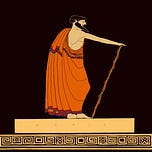



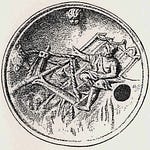

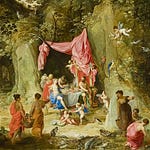
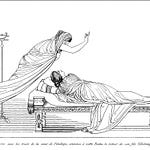
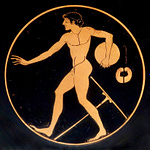



“A virgin: who never yet was brought under the yoke by a man”—Homer in English